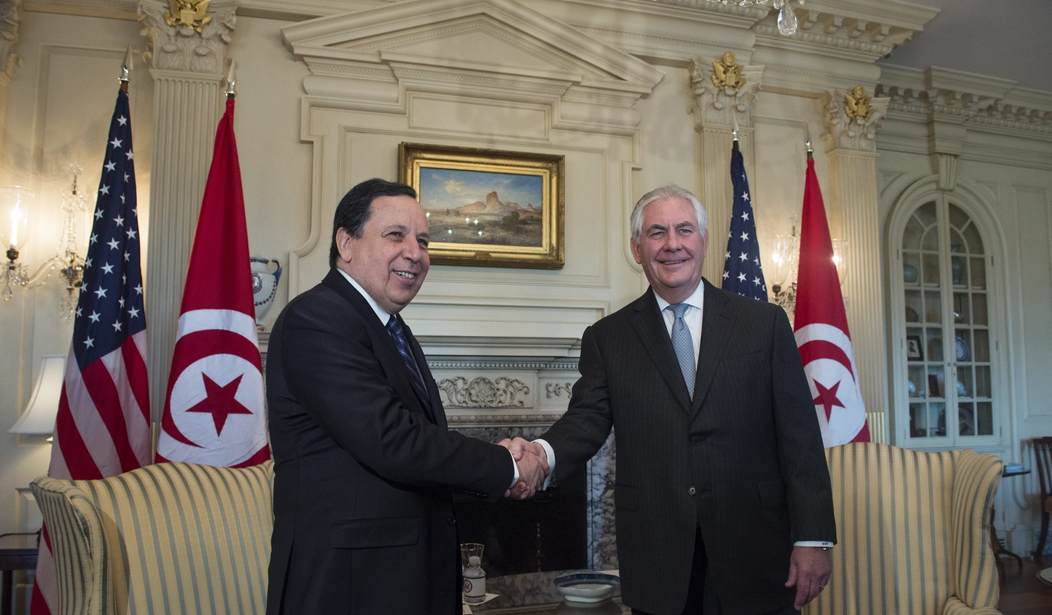WASHINGTON – Tunisian Foreign Minister Khemaies Jhinaoui on Tuesday called on President Donald Trump to continue financial support for the North African nation in order to combat radical Islam in the region.
Tunisia is considered the most successful democratic uprising from 2011 Arab Spring, and is the country from which the global movement originated, but Jhinaoui stopped short of calling his government a democracy. He described Tunisia as a 6-year-old child who will need U.S. and European support to grow into a true democracy.
“I think the uniqueness of [the Tunisian Revolution] is to show to the rest of the world that this bridge between Islam and democracy can work,” Jhinaoui, who met in Washington separately with Secretary of State Rex Tillerson and Sen. John McCain (R-Ariz.) on Monday, said at the United States Institute of Peace. “This is a Muslim-Arab country proud of its heritage but ready to spur international values and become a member of the concert of democratic nations. I think we are on the right path.”
The Tunisian Revolution was triggered in January 2011 following the suicide of 26-year-old street vendor Mohamed Bouazizi, who lit himself on fire in public after government officials allegedly harassed him and confiscated materials he needed for work. The revolt, also known as the Jasmine Revolution, led to the ouster of longtime president Zine El Abidine Ben Ali and inspired Arab Spring uprisings in several other countries.
Jhinaoui said Tuesday that U.S. support, which surged in the final years of Barack Obama’s presidency, has been critical to Tunisia’s success. The Obama administration in 2015 provided $100 million in military and counterterrorism support to Tunisia, bringing the total amount of support following the 2011 uprising to nearly $700 million.
Jhinaoui called the Tunisia uprising “an explosion of freedom of expression,” pointing to the 86 newspapers that have sprouted up in a country where just one existed for about 60 years.
“We are very proud of the achievement made on the democratic process, but still we are just in the beginning,” he said. “We are not a democracy yet. We are aspiring to become a real democracy, but democracy with security, with economy, with prosperity, with shared prosperity among Tunisians.”
Tunisia’s transformation into a democratic state has been fraught with setbacks and threats, Jhinaoui said, pointing to the terrorist attacks that plagued the country in 2015. In March of that year, three gunmen killed 22 people at the landmark Bardo Museum in the country’s capital of Tunis. Though ISIS claimed responsibility for the attack, the Tunisian government later raided and killed members of a local al-Qaeda splinter group.
Another attack followed in June 2015, when extremist Seifeddine Rezgui Yacoubi gunned down 38 people at a beach hotel in Sousse. Then in November 2015, ISIS claimed responsibility for a suicide bombing on a bus transporting members of the Tunisian presidential guard in Tunis, killing 12 people.
“The Tunisian experience is still fragile and vulnerable to domestic and regional threat,” Jhinaoui said. “Recent worldwide tragic events have demonstrated the expansion of the world map of terrorism, showcasing its global aspect, which needs proper response not just by military means but by also an economic and social approach.”
He said the most significant threat to stability in Tunisia is the ongoing conflict in Libya, which grew out of the Arab Spring protests and resulted in the ouster and death of Moammar Gadhafi. The conflict has left the country’s oil industry devastated and resulted in tens of thousands dead.
Jhinaoui in February met with the foreign ministers of Algeria and Egypt in an attempt to find peaceful resolution in Libya. The group signed the Tunis Declaration, voicing a commitment to ending the turmoil in Libya. The trilateral agreement, he said, needs the support of other international partners as Tunisia and the U.S. have a mutual interest in combating terrorism and bolstering democratic efforts in the region.
“Tunisia, with the collaboration of the European Union and American partners, could be a model for countries that are capable of social resilience in the fight against the scorch of terrorism and extremism in the region,” Jhinaoui said.









Join the conversation as a VIP Member